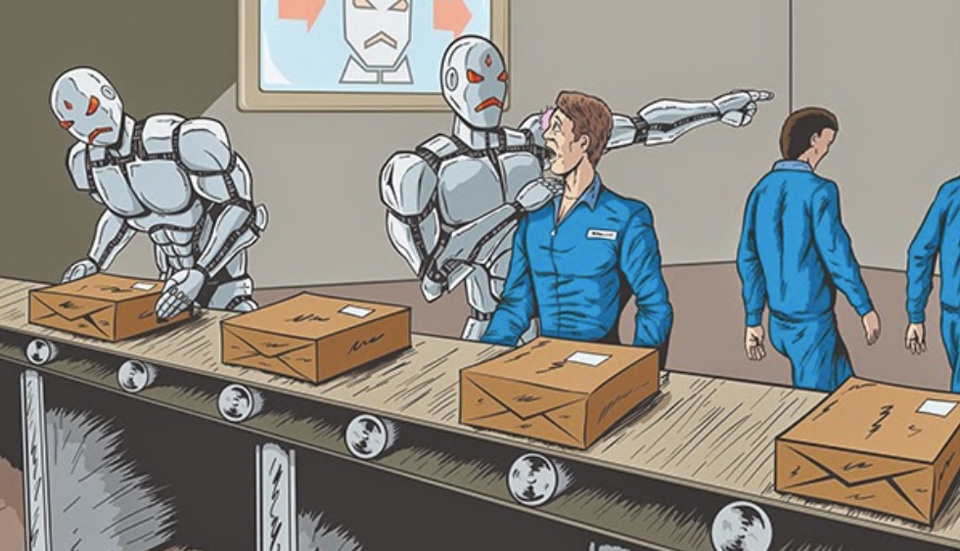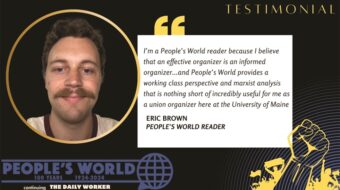
ST. LOUIS—Here at the AFL-CIO Convention, a majority of the four days we have together is devoted to discussing the wellbeing of the current labor movement. As it should and needs to be.
Yet hovering over the proceedings is the specter of the new economy, a rocky dystopia littered with the debris of traditional industries, professions, and neighborhoods.
From the main stage, where over 50 resolutions are being debated, to the sidelines, where breakout panels are able to dive into some existential rumination about the future of work, convention participants are sketching out a greater understanding of what labor is facing in the coming decades.
Is there hope? Or should we start steeling ourselves for an agonizing, slow demise of our earthly home?
“We are at a time when work is increasingly precarious and the idea of having a stable job throughout one’s career is diminishing rapidly,” says the text of Resolution 5, “Commission on the Future of Work and Unions.”
“Advances in technology are reducing jobs in some sectors and requiring new skills and knowledge in others,” it continues. “The prevalence of part-time, temp, on-call, and subcontracted work arrangements; the emergence of low-road employment strategies in growth industries; and the continued growth of low-wage sectors have upended workplace security. Therefore, we must rethink ways of building bargaining power and providing economic security for millions of Americans, and we must make sure that we as a movement are effectively organized and structured to get it done.”
A just transition
But that’s only part of the story. One panel, called “Global Dialogue on a Just Transition” (Oct. 23), featured a combination of American labor theorists and invited international guests to contemplate the future of a planet we may or may not be able to rescue from the inexorable effects of global warming.
Panel moderator Brad Markell introduced Sharon Burrow, general secretary of the International Trade Union Confederation and former president of the Australian Council of Trade Unions. Look around at what’s happening with the avalanche of global climate disasters, she observed: “It’s like a gross horror story. If we lose the fight against climate change, it’s humans who will suffer. Nature will recover, but there are no jobs on a dead planet.”
Yet with the benefit of a sober long view, she reassured her listeners, it is possible to envision a different future. After all, “the fundamental industries of yesterday will be the fundamental industries of tomorrow.” Over the centuries, and increasingly in recent decades, humanity has adapted, and will continue to do so. Now the challenge is to ensure equity in the transition to a clean energy world. Fair globalization requires a strong union movement and sufficient political will. Are we capable of it?
A growing body of encouraging case studies already exists, as the world moves away from fossil fuels and nuclear power to renewable solar, wind, geothermal, etc. In the small town of Port Augusta, at the gateway to the desert of central Australia, two coal-fired power stations closed down. Solar was installed, and the resulting employment, plus an uptick in tourism and agriculture, brought new life to the area. Unions working with the regional network of “flying doctors,” who travel from one remote locale to another to provide health services, and green groups devised emission control projections to fit into the national energy growth plan. With ongoing dialogue among labor, government, and investors, progress toward green energy can be achieved. “Just transition is the mission,” said Burrow.
Many other examples can be cited as well, from national oil companies such as Norway’s, which has committed to reducing production and increasing transition to green energy, to the 2015 Paris Agreement that includes almost every country in the world in a global promise to halt the pace of climate change. The agreement included a “just transition” clause precisely because labor advocates played a part in its negotiation. Brad Markell reassured the panel that, according to the terms of the agreement, a country can only formally exit in three years at the earliest. If Trump fulfills his threat to withdraw from it, that could not take effect until one day before the next presidential election.
John Brauer, of the California Federation of Labor, spoke about Bill 8398 which recently passed in his home state’s legislature. It contains effective measures to reduce emissions in the state by 40 percent by 2030. The transition will create jobs in many sectors: construction and building, energy, transportation, hospitality, manufacturing, and healthcare. Apprentice programs and new hiring are to be included in contracts; the new gas tax includes $5 million for apprenticeships; union relationships are guaranteed in new building construction; maximum carbon levels in building materials are established; and workforce training is mandatory. The goal is to make manufacturers responsible employers.
A realistic transition
Jamal Watkins, a clean energy economic consultant, acknowledges the complexity of environment-friendly transition in the economy. Any decision inevitably touches on many job sectors. For example, whether a car is powered by gasoline or electricity, that path will yield a very different environmental impact. Consider the way we produce and distribute music: We are no longer making 8-track cassettes (they’re mostly in landfills now), and compact discs are nearly obsolete too. But in the digital transition, what rare minerals such as lithium and cobalt are we mining, and are they acquired under fair, equitable, and healthful conditions? How about wind power? Modern windmills are made of steel, but steel is made with coal. How do we produce the steel that will make the windmill?
In that respect, Watkins is a transition realist. We need to set reachable benchmarks and achievable timetables. Divestment from fossil fuel companies is a viable strategy only in cases of willful refusal to evolve. If Boston, where he worked for a time, decides solar panels are the way to meet emission standards, how many people in the mostly Black and brown suburbs of Roxbury and Dorchester can afford them?
And is solar conversion a good job? Wages do not rise and fall on their own in a neutral marketplace: There are individuals making decisions about who gets paid what. If a society decides to adopt green standards, then those solar rooftop installers cannot get $13 an hour with no benefits. We cannot build a green world just so that someone gets rich on the backs of working people.
Transition is as much sociology and anthropology as it is science and technology. As we pursue a greener planet and environmental justice, what communities are impacted, what interconnectedness to other issues comes into play, and what political effects will ensue? One size will not fit all, but fairness in all cases must be constantly addressed.
Sharon Burrow also called for due diligence for violations of labor rights and environmental damage. In the case of Samsung, for example, the anti-union South Korean company uses chemicals that have killed 70 workers in Korea, and injured hundreds of others. Yet according to international trade agreements that favor corporations exclusively, there are no rules about stating what the chemicals are. Those are protected “trade secrets.” There is still much work to do in mapping the supply chain, and the new computerized technology is not exempt. The labor movement needs to be the conscience of poor practice on a global scale.
An automated transition
A second group of speakers addressed automation on the Global Dialogue on Just Transition panel. Ed Wytkind, an assistant to AFL-CIO President Trumka who for twenty years represented transportation issues before the government, anticipated that we’re soon going to be seeing a lot of humanless travel. Freight rail through the 1940s and beyond had eight- or nine-person crews, but now just one or two. When driverless transportation peaks, an industry that presently employs 1.7 million drivers of trucks, taxis, buses, subway trains, and even planes will lose some 300,000 jobs per year. In a December 2016 report on jobs of the future, the Obama administration estimated that 47 percent of present jobs will be automated.

A decline in bargaining power will inevitably accompany the growth of the new tech sector, little of which is unionized. Among advanced economies, the U.S. is especially poorly prepared for a just transition.
Yet agonizing over automation is not a strategy. A great part of tech growth has come about thanks to taxpayer investment—in the military, in universities, in hospitals, and other places with government funding. Even the “private sector,” such as Silicon Valley, has benefited from government assistance in many forms: tax exemptions, permissions, roads, building easements, education of the workforce, etc.
It’s up to the labor movement to articulate the demand that society as a whole—embodied in government—must give back to the economy some compensation for massive job losses and retraining for the next generation of jobs.
Plamen Dimitrov, president of the trade union movement in Bulgaria, expanded on the automation question, emphasizing the scale, speed, and scope of the coming transition. Two-thirds of the world’s population will be internet connected within five years. By next year, China will surpass the U.S. as the largest digital economy in the world. But who owns the technology, data, and power? How will the advantages and profits be shared? He quoted Vladimir Putin, saying, “Those who own and control A.I. (Artificial Intelligence) will own the world.”
In the developed world, Dimitrov estimates, 10-25 percent of jobs will disappear, but the underdeveloped world will suffer even more as inequality grows across the globe. If we are not only to protect the workers, but save humanity itself, a global social security system will have to be reconstructed, not necessarily linked to jobs. The Europeans are currently discussing guaranteed income insurance or universal basic income (UBI). In the Canadian province of Ontario, a pilot program is already underway. It would be a far stretch, though, to imagine American politicians issuing monthly UBI checks without also abolishing all other social welfare programs.
Socialist China is investing a fortune in infrastructure. The cities and highways, schools, rivers and levees, energy grid, and environmental improvements in the U.S. similarly cry out for massive investment. We have an estimated 60,000 bridges in danger.
Clearly we need a mass-scale commitment to these projects if we aim to continue making a contribution to the advancement of the planet consistent with the wealth and talent of our nation. But we would require a very different set of people in elective office than the ones we have today.
If there is no reversing the digital revolution, the question is: Who has the bargaining power to ensure that the transition is humane, just and sustainable, and not arbitrarily imposed?
And if we know that the economy and political system are already rigged for the one percent, then we must also grasp the reality that the labor movement is the only thing standing in their path—which accounts for their relentless drive to crush us.
In ways almost too vast to intellectually comprehend, the fate of humanity depends on our own success at transforming our anger and frustration into the unbeatable force of universal solidarity the world needs to create a better life for all and leave no one behind.












Comments